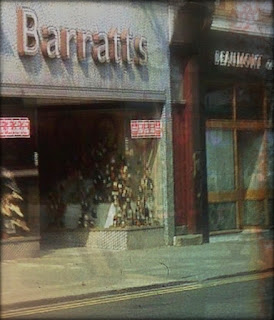After dithering about for ages, Dad and I set off for Bethany. The weather was blustery, with occasional blowing drizzle and scudding clouds, but it didn’t bother me. What disturbed me more was seeing all the crowds.
We parked the car and took the path across the fields from the back of the museum, striking out along the road and turning off down a grassy path towards Bethany Lake. Ahead of us walked a girl wearing a headscarf, loose black jumper, ankle length red flowing skirt and with a blue haversack over her shoulder. She looked quaint and fit in with her surroundings. Our route precisely echoed
the one we took in July and as before we ended up at Tunscarr Edge, where we spent five minutes picking up litter (orange peel, tin cans, plastic bottles, teabags, crisp and sweet wrappers) left there by the hordes of Sunday trippers. I felt angry.
We ate dinner in a hollow above the rocks and talked about predictable subjects while admiring the view, which really is tremendous. The flat moor side seemed to reflect the colours of the overcast sky; it glowered dark and black but when the sky brightened with blue, the moor took on a greenish brown hue. I imagined how Helen Vaughan herself might've reacted to this view, because I don’t suppose it’s changed much in a hundred years.
If she was to come back through time perhaps she might awaken looking up at the sky, right there where we sat in that hollow above the Edge, opening her eyes to see those same ever-changing clouds, sitting up to stare for long moments out over the familiar moorland horizons. . . . Perhaps she'd feel as though she’d just fallen asleep and had had a particularly vivid and nasty dream, and only slowly would it dawn on her that something was wrong; too many houses now and, what are those strange needle-like towers everywhere? But in essentials these hills and hollows and skyline shapes won’t have altered in a century; it “thrills my imagination” to think that she might not see anything immediately unfamiliar or out of the ordinary. Perhaps this way we come as close to the dead as we can ever be.
We walked back on the popular Vaughan's Walk path which was deeply eroded and muddy. We must’ve looked very scruffy, me in my long formless jumper and muddy boots and Dad weather beaten beneath his flat cap.
As usual the museum was packed, echoing to alien voices and the scores of clumping feet, the very room in which she slept and died now privy only to disinterested faces yawning at the glass cases. I tried to keep hold of that same mood I'd felt on the moors, but there among so many
living people it had gone. . . .
The Church was better, and the few pathetic scraps of heather by Vaughan’s plaque looked lost and out of place amid the unfriendly stone. It's good that she’s stuck away in a corner of this unfussy church, still so obviously concerned with 20th-century Bethany. I get the feeling that some people don’t actually realise she’s buried there.
Afterwards we wandered up into the village which is an awful place, seething with cars and people (“Harp Tea Shop” etc.). Dad bought me a postcard showing Vaughan in silhouette and then we left, and I felt grey and miserable, like the weather.
It’s about time I heard something from Watermouth and the grants people. But at least I got another letter from Claire.































